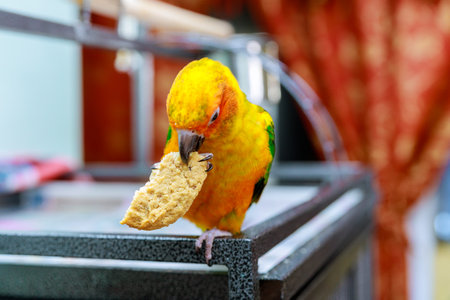1. Importance of Proper Ventilation
Good airflow is essential for keeping your bird healthy and comfortable. Birds have delicate respiratory systems, and poor ventilation can lead to respiratory problems, excessive humidity, and the buildup of harmful airborne particles.
How Proper Ventilation Helps Your Bird
- Prevents Respiratory Issues: Birds are sensitive to dust, dander, and airborne toxins. Proper airflow helps remove these irritants, reducing the risk of respiratory infections.
- Maintains a Fresh Environment: Stale air can cause unpleasant odors and allow bacteria or mold to grow. Good ventilation keeps your bird’s cage smelling fresh and clean.
- Regulates Humidity Levels: Excess moisture in the air can lead to mold growth and bacterial infections. Proper airflow helps maintain a balanced humidity level that is safe for your bird.
Signs of Poor Ventilation
If your birds environment lacks proper airflow, you may notice these warning signs:
| Sign | Description |
|---|---|
| Frequent Sneezing | Your bird may be reacting to dust or airborne irritants. |
| Mold Growth | Damp conditions due to poor airflow can promote mold buildup. |
| Lingering Odors | A persistent smell around the cage may indicate stale air. |
| Lethargy | Poor air quality can make your bird feel sluggish or unwell. |
Ways to Improve Cage Ventilation
- Avoid Placing the Cage in an Enclosed Space: Keep your bird’s cage in an area with good air circulation, away from tight corners or closed cabinets.
- Use a Fan (Indirectly): A gentle fan near the room (not directly on the cage) can help keep air moving without creating drafts.
- Keep Windows Open When Possible: Allowing fresh air in periodically can improve overall air quality.
- Avoid Air Fresheners and Smoke: Scented sprays, candles, and smoke can harm your bird’s lungs—opt for natural ventilation instead.
2. Choosing the Right Location for the Cage
Finding the perfect spot for your bird’s cage is essential for their health and comfort. Proper ventilation and lighting play a crucial role in their well-being, but it’s equally important to avoid exposing them to drafts or sudden temperature changes. Below are some key factors to consider when positioning the cage.
Ensuring Proper Ventilation
Your bird needs fresh air, but direct exposure to strong air currents can be harmful. Here’s how to achieve good airflow without causing discomfort:
- Avoid placing the cage near vents or fans: Air conditioning, heating vents, and ceiling fans can create strong drafts that may make your bird sick.
- Choose a well-ventilated area: A room with natural airflow helps keep the air fresh, but avoid putting the cage in a completely enclosed space.
- Keep the cage away from kitchen fumes: Cooking fumes, smoke, and strong odors from nonstick cookware can be toxic to birds.
Managing Temperature Changes
Birds are sensitive to sudden temperature shifts, so its important to maintain a stable environment. Consider these tips:
- Avoid placing the cage near windows and doors: Sudden temperature changes from opening doors or direct sunlight through windows can stress your bird.
- Keep the cage away from direct sunlight: While natural light is beneficial, too much sun exposure can overheat your bird.
- Monitor room temperature: Aim for a consistent temperature between 65-80°F (18-27°C), as extreme cold or heat can be dangerous.
Best and Worst Locations for Your Bird’s Cage
| Good Locations | Avoid These Locations |
|---|---|
| A well-lit corner with indirect sunlight | Near air vents, fans, or drafty windows |
| A room with stable temperature and good airflow | Kitchens due to fumes and smoke risks |
| An area where family members spend time (for social interaction) | Laundry rooms with excessive humidity |
| A space away from loud noises and sudden movements | Garages or basements with poor ventilation |
![]()
3. Ensuring Adequate Natural and Artificial Lighting
Proper lighting is essential for your bird’s health and well-being. Birds rely on natural sunlight to regulate their circadian rhythm, which affects their sleep, mood, and overall vitality. When natural sunlight isn’t available, using the right artificial lighting can help maintain a balanced environment for your feathered friend.
Why Natural Sunlight Matters
Natural sunlight provides essential UV rays that contribute to vitamin D production, helping birds absorb calcium for strong bones and healthy feathers. It also plays a key role in regulating their internal clock, ensuring they stay active during the day and rest properly at night.
Benefits of Natural Sunlight
| Benefit | Description |
|---|---|
| Vitamin D Production | Helps with calcium absorption for bone and feather health. |
| Circadian Rhythm Regulation | Maintains a proper sleep-wake cycle for energy and mood balance. |
| Natural Behavior Stimulation | Encourages normal activity levels and reduces stress. |
Providing Proper Artificial Lighting
If your home doesn’t get enough natural sunlight, artificial lighting designed for birds can help replicate the benefits of natural light. Full-spectrum bulbs that emit UVB and UVA rays are ideal for maintaining your bird’s health.
Choosing the Right Artificial Light
- Full-Spectrum Bulbs: These mimic natural sunlight and support vitamin D synthesis.
- UVB & UVA Exposure: Helps with calcium metabolism and enhances vision.
- Consistent Light Schedule: Keep a regular day-night cycle to prevent stress.
Best Practices for Bird Cage Lighting
To create an optimal lighting setup for your bird’s cage, follow these guidelines:
Lighting Tips
- Place the cage near a window: Ensure indirect sunlight exposure but avoid direct drafts.
- Use full-spectrum bulbs: Position them above the cage and keep them on for about 10-12 hours daily.
- Avoid harsh or flickering lights: This can cause discomfort and stress.
- Maintain a consistent schedule: Turn lights on in the morning and off at night to mimic natural cycles.
A well-lit environment helps keep your bird happy, healthy, and engaged. Whether through natural sunlight or artificial sources, ensuring proper lighting will support their overall well-being.
4. Avoiding Harmful Air Pollutants and Stagnant Air
Ensuring clean air for your bird is essential for its health and well-being. Many common household pollutants can negatively impact your bird’s respiratory system, making proper ventilation a key factor in maintaining a safe environment.
Common Household Pollutants to Watch Out For
Certain airborne substances found in homes can be harmful to birds due to their sensitive respiratory systems. Here are some common pollutants you should avoid:
| Pollutant | Sources | Why It’s Harmful |
|---|---|---|
| Cigarette & Vape Smoke | Smoking indoors, secondhand exposure | Irritates respiratory system, can lead to serious lung issues |
| Scented Candles & Air Fresheners | Candles, plug-in fresheners, sprays | Contains chemicals that can be toxic when inhaled by birds |
| Cooking Fumes & Non-Stick Cookware | Kitchens with poor ventilation, Teflon-coated pans | Teflon fumes are deadly to birds; smoke and grease can irritate lungs |
| Chemical Cleaners & Aerosols | Household cleaning sprays, disinfectants | Toxic chemicals can cause respiratory distress and poisoning |
| Mold & Dust | Damp areas, unclean cages, dusty rooms | Affects breathing and may trigger infections or allergies |
Tips for Keeping the Air Clean and Fresh
You can take simple steps to improve air quality around your bird’s cage and ensure a healthier living space:
Avoid Using Harsh Chemicals and Fragrances
If possible, switch to natural or unscented cleaning products. Avoid burning scented candles or using aerosol sprays near your birds cage.
Improve Ventilation in Your Home
A well-ventilated space prevents stagnant air and removes potential toxins. Keep windows open when possible (while ensuring your bird is safe) and use fans to circulate air.
Add an Air Purifier (Without Ozone)
A high-quality air purifier with a HEPA filter helps remove dust, dander, and airborne toxins. Be sure to avoid purifiers that produce ozone, as it is harmful to birds.
Avoid Non-Stick Cookware When Cooking Near Your Bird
Teflon-coated cookware releases toxic fumes when overheated. Opt for stainless steel or cast iron instead.
Keeps Cages and Surrounding Areas Clean
Dust, mold, and old food particles can contribute to poor air quality. Regularly clean the cage, change bedding materials often, and keep the surrounding area tidy.
5. Maintaining a Balanced Environment
Creating a well-balanced environment for your bird involves managing both ventilation and lighting to ensure comfort and well-being. Proper airflow helps maintain fresh air circulation, while appropriate lighting supports their natural rhythms. Here’s how you can achieve the right balance.
Ensuring Proper Airflow
Good ventilation is essential to prevent stale air, eliminate odors, and reduce airborne contaminants. However, too much airflow can create drafts that may be harmful to your bird. Follow these guidelines:
| Ventilation Factor | Best Practices |
|---|---|
| Avoid Direct Drafts | Keep the cage away from windows, fans, and air vents to prevent cold drafts. |
| Use an Air Purifier | A high-quality air purifier with a HEPA filter can help remove dust and allergens. |
| Ensure Fresh Air Circulation | Open windows occasionally (with screens) to allow fresh air in without exposing your bird to direct wind. |
Providing the Right Lighting
Birds need both natural and artificial light to regulate their internal clock and stay healthy. Consider these tips for optimal lighting:
- Natural Light Exposure: Place the cage near a window but avoid direct sunlight for extended periods to prevent overheating.
- Full-Spectrum Lighting: If natural light is limited, use full-spectrum bulbs designed for birds to mimic daylight.
- Consistent Light Schedule: Maintain a regular light-dark cycle by turning lights on and off at the same time each day.
- Avoid Harsh Artificial Lights: Fluorescent lights that flicker may stress your bird; opt for steady, warm lighting instead.
Creating a Comfortable Atmosphere
A stress-free environment is just as important as proper ventilation and lighting. Keep noise levels moderate, provide hiding spots within the cage, and maintain a consistent routine to help your bird feel secure. By balancing airflow and lighting properly, you can ensure your feathered friend stays happy and healthy in their home.


